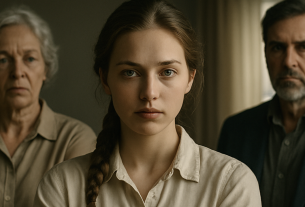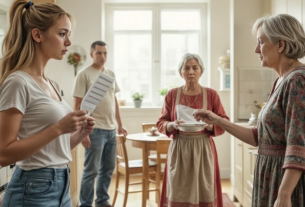— You spoiled the borscht again, Ol’, — Alexey said with a barely hidden look of disgust on his face, poking at the bowl with his spoon. — Maybe it’s time to get a new fridge? Or at least cook less.
— Or eat faster, — Olga muttered, not looking up from her phone. — Or better yet, just don’t come home at all. Then the food will stay fresh.
Alexey smirked, but it sounded somehow pitiful. He sat at the kitchen table, sitting up straight as if someone was checking his posture. The tabletop was chipped in many places; the plates didn’t match — one floral, another Soviet-era, and a third with a “Megafon” logo.
—I was joking, Ol’, — he said quietly, rubbing the bridge of his nose. — It’s morning. Why are you like this?
— Because your mother sent me a three-minute voice message yesterday, — Olga sharply raised her eyes. — Do you want to hear how she calls me a “greedy old hag,” a “freeloader,” and an “ungrateful parasite”?
— Well, she just… — Alexey started but stopped himself.
— What? Just? Does she have permanent menopause? Or does her battery run on insults?
— She’s just worried. She lives in a rented apartment. And you have eight million. She’s still your mother, after all…
Olga put her phone down. There was something steel-hard in her gaze.
— You know, sometimes I wonder… are you really an accountant? Or is that just a cover for economic crimes? Because if you really know how to count, why can’t you add two and two? That’s my money. Registered to me. It came from my grandmother, whom, by the way, you’ve never once visited. Not once, Alexey!
— I just… well… she lived in Voronezh…
— And now, remind me, where does your mother live?
— In Mytishchi…
— And where is our apartment?
— In Lefortovo…
— Really, not far at all. The same eight metro stops.
Alexey fell silent. The room grew quiet. The plates scraped with spoons as if they felt awkward too.
— She just wants a little house, — he whispered. — A one-bedroom, but her own. With a garden. Not a doghouse in the end.
— You know, I have a garden. It’s called “Lilac Grove” residential complex — there’s a flowerbed and parking. But for some reason, no one bought me anything. I earned it myself. And your mother has no grandchildren, no job, but ambition enough for three people.
— Are you bringing up grandchildren on purpose now? — Alexey tensed.
— No, I’m just stating facts, — Olga answered coldly. — She worked at a pharmacy for twenty years, saving only for lipstick. And now, by her logic, I’m supposed to buy her a house because… she gave birth to you. Fine. Then you provide for her. And I’ll look for a husband with a smaller baggage.
— That was hurtful, — Alexey grumbled.
— And it’s normal that your mother regularly sends me advice on how to behave?
— She’s just worried, — he started again.
— Alexey, her vocabulary consists of three words: house, money, Olga. Everything else is curses and lectures.
There was a knock on the door.
Olga raised her eyebrows.
— Speak of the devil…
Alexey jumped up, straightened his T-shirt like he was about to take an exam.
— I’ll get it, — he said quickly.
Olga didn’t move toward the hallway. She stayed in the kitchen quietly chewing a cabbage pie. The only thing reminding her of her grandmother. Grandma used to bake them on weekends, placing them on a tray with a clean towel. Never asked who owed what. Just did it because she loved.
— Well, here we are, — Tamara Petrovna declared cheerfully, entering the apartment with an authoritative look. — And you’re eating that stinky cabbage again?
— Come in, Tamara Petrovna, — Olga forced a smile. — Just don’t step on the rug. Last time you confused it with a rag.
— It is like a rag, — the mother-in-law noted after looking around the hallway. — Dust everywhere. All because the hostess isn’t a proper hostess. If I had my own apartment, I’d have things in order.
— Why don’t you clean up your character first? — Olga couldn’t hold back.
— Here we go, — Tamara threw up her hands. — I just walked in, and I’m already the enemy of the people. And all because of money. She has eight million! And I, an old mother, in a rented Khrushchyovka with cockroaches!
— You have cockroaches in your head, Tamara Petrovna, — Olga sighed, standing up. — And if you say one more time that I owe someone something — I’ll call the precinct officer. Let him explain to you that adults are responsible for themselves. Even if they are sixty-three and know how to manipulate without a button.
— Did you hear that, son? — the mother turned to Alexey. — And you said she’s kind. She’s kicking me out!
— Mom, don’t start…
— Don’t start?! I gave birth to you, swaddled you, carried you to school myself! And you can’t even help your mother! What kind of man are you?
Alexey looked at both of them like an arbitrator who forgot to bring a whistle and instructions.
— Ol’, — he said quietly, — well, we’ll buy her a small house. At least in Podrezkovo. I… I’ll pay you back later.
Olga froze.
— What do you mean “we’ll buy”?
— Well… I… applied for a mortgage. Didn’t want to bother you. Calculated everything, financially it works out. At first, you could…
— You took out a mortgage?! — Olga spoke quietly. — In whose name?
— In mine, of course. But you… You do understand… It’s easier for us to pay it off together…
Silence fell in the kitchen.
Olga silently went to the cabinet. Opened it. Took out two plates. Then opened the window. Went to it.
— Ol’, what are you doing?.. — Alexey asked, frightened.
One plate after another flew down, shattering loudly on the asphalt.
— These were the last plates from my dowry, — she said. — And now you heard the sound that broke your trust. And your marriage. Congratulations.
— You’re not serious… — he mumbled.
— I’m more serious than a mortgage in Podrezkovo. In two days, you’ll live with your mother. I hope she has dishes. And now I’m a free woman with eight million. And yes, I love cabbage pies. Remember that, Alexey. That’s everything you didn’t know about me in ten years of marriage.
Olga stood by the sink, mechanically rinsing a cup. The water flowed and flowed, hot and steaming, as if it was washing away everything — the talks, reproaches, that nasty “Olechka” from Tamara Petrovna, which sounded like a knife scraping porcelain.
Alexey tiptoed into the kitchen, as if afraid to scare someone. Or himself.
— Ol… how are you? — he uncertainly muttered, scratching the back of his head.
— Hot, — she replied dryly, without turning. — I thought hell should be hot. Seems I guessed right.
— What are you talking about now?..
— You guess, Lyosh. You have a rich imagination. You took out a mortgage on your mother behind my back. Without me. So you know how to act. Independent now.
— Wait, — Alexey raised his hands defensively — you misunderstood…
— Oh, really? How should I understand that you went into debt on my ass? — she turned sharply, looking him straight in the eyes. — Come on, turn on your accountant and explain: what’s the economic benefit, and most importantly — the human one?
He hesitated, sat heavily at the table, and stared into his mug as if it was a lifebuoy.
— Mom… she… well, you know, she’s alone… rented apartment… every month is stress. She’s aging, Ol’. I just wanted… well, so she’d have her own place at the end of her life.
— And at whose expense is this life’s ball, Lyosh? — Olga grabbed a towel and wiped her hands furiously. — Am I keeping you awake at night with my rented apartment? Or does your conscience bother you that she’s not on rugs?
— I thought you’d help… You have money now…
— Did you ask? Do you know that this money is from the grandfather who raised me while your mother was jumping around the summer houses? That he saved for me, not for your mommy who, by the way, can’t stand me?
He looked up.
— Well, maybe not that much can’t stand…
— Yeah, right! — Olga laughed bitterly. — She always considered me an attachment to you. And now I’m an ATM. “Olechka, darling, you’re such a good girl.” And as a mother-in-law, she was and remained a she-wolf. Only now with manicured nails and hopes for a mortgage.
Alexey stared out the window. The pause stretched. You could hear a drip clicking in the sink.
— I didn’t think you’d just… cut like this, — he finally said. — You’re kind, you always understood everyone…
— I’m kind as long as people treat me like a person, — she interrupted. — But when they treat me like a thing — my character turns on. You know, Lyosh, if you had come to me honestly and said, “Mom’s gotten on my nerves, I want to help her, let’s think it through” — maybe I’d have agreed. But you chose to play the hero behind my back. Now be kind and pay for it yourself.
— I thought we were a family…
— You were wrong. I’m the family. And you’re its adjective.
There was a knock at the door. Not just a knock — the way only mothers-in-law know how: short, loud, insistent. Alexey flinched. Olga — did not.
— Go, — she threw. — Your happiness is there. Maybe she even brought slippers.
He hesitantly opened. Tamara Petrovna came in like a storm. In her hands — a bag with a cake and a newspaper with “house 4.8 million” circled in bold.
— Olechka! — she beamed. — Sweetheart, I was thinking — we could go look? The house is a dream! Only forty minutes by shuttle, and you have your own garden! And there will be grandchildren too — there’s space to play!
Olga didn’t even flinch. She just turned to face her.
— Tamara Petrovna. We didn’t switch to “you” yet, right?
— Oh… come on, — the mother-in-law giggled — we’re almost like friends now…
— Friends? — Olga turned to Alexey. — Did you tell her?
— Well… I thought I should prepare the ground…
— Prepare the ground, — she repeated slowly. — Seriously. And you didn’t forget that I’m married, not enslaved?
— Olechka, — Tamara Petrovna interrupted, — why are you so bitter? I mean well… I’m not asking for a palace! Just a corner! I have nothing! No husband, no apartment of my own!
— By the way, I also had nothing, — Olga answered calmly. — But I didn’t come to anyone begging. I worked. I lived. I kept silent when you jabbed me about the borscht. And now, when I got what’s rightfully mine, you came to divide it. So, Tamara Petrovna, buy your own house. Or live with the one who loves you so much he took a mortgage without asking.
— You… you’re refusing me?! — tears filled Tamara Petrovna’s eyes. — I raised you! I accepted you like a daughter! And you…
— Exactly, accepted. Not loved. Do you know the difference between acceptance and love? Love is when you forgive, acceptance is when you tolerate. You tolerated me all the time. So… it’s logical.
Silence. Even the fridge seemed to freeze.
— Then… I’ll curse you! — suddenly shouted the mother-in-law. — Money won’t bring happiness! You’ll regret it!
— Well, wonderful, — Olga said calmly. — Now get out. And take your cake — sweets haven’t gone down well for a long time, especially with that aftertaste.
Tamara Petrovna squealed, turned, and slammed the door. Alexey stayed standing, hunched like a schoolboy after a scolding. He wanted to say something but couldn’t. Just opened his mouth and closed it again.
— You’re going after her, right? — Olga asked quietly.
He nodded silently.
— Well, go. Just don’t come back. Not even for slippers.
Two months passed.
Olga lived alone. Without Lyosha. Without his quiet morning footsteps. Without calls from Tamara Petrovna that always started with the sickly sweet “Olechka, dear” and ended with “well, just think about it, we are family.”
She thought.
Every evening, sitting with a glass of wine in her new apartment, bought with only part of the inheritance. She bought it without any fuss — not in an elite building, not in a tower with parking, but a regular two-room in a Stalin-era building. High ceilings, old parquet, and a balcony with real cast-iron railings. Her own.
For the first time in many years, she felt what it was like — not to be someone’s wife, daughter-in-law, or option. Just herself. Sometimes boring. Sometimes lonely. But free.
One evening Alexey called her. At first, she didn’t want to answer. But then she did. Curiosity, probably. Or… there were still a couple of splinters in her soul she wanted to pull out.
— Hi, Ol’.
— Hi. Something happened?
— Mom died, — he said quietly.
She was silent. Not because she didn’t know what to say. Just didn’t feel anything.
— Heart attack. In a store. She argued with the cashier about expired mayonnaise. Her heart couldn’t take it.
— I see. I don’t need condolences if you’re leading to this.
— No, I’m not leading there. Just… — he swallowed. — We said a lot to each other.
— Yes, — she said calmly. — But I don’t take anything back.
— Neither do I.
Silence. A normal city line. Even in the pause — life. Cars, sirens, someone’s footsteps on the phone.
— She left that mortgage, — he mumbled. — Now I’m carrying it alone. Honestly, I can’t handle it. Want to sell. Move somewhere simpler. Maybe a room at first.
— Why are you telling me this, Lyosh?
— I don’t know. Maybe I wanted you to feel sorry.
— I don’t.
He was silent.
— You’ve changed.
— No, Lyosh. I just stopped pretending.
A week later, Alexey showed up at her door. No flowers. No cake. Just a folder with documents and a tired look. She opened to him like to an old acquaintance. Not an ex. Not an enemy. Like a chapter not yet finished.
— Here… the documents. Divorce. Please sign.
She took the folder. Sat down. Signed. He looked at her like a thing lost and only now understood how important she was.
— I didn’t expect you to leave for good, — he said quietly.
— Neither did I, — she answered. — But, you know, every woman reaches a moment when she stands up and leaves. Doesn’t slam doors. Doesn’t shout. Just leaves. And then never returns. Not for slippers, not for the past.
He nodded.
— Was I a bad husband?
— No. You were average. And average is worse than bad. Because you at least remember the bad ones. But the average — like gray wallpaper. No comfort, no irritation.
He stood up. Wanted to say something. To ask? To apologize? But changed his mind. Turned and left. Olga closed the door behind him and for the first time since the divorce took a deep breath.
Later she went to the notary. In her grandfather’s name, there was still a small dacha in the village she hadn’t touched. Maybe a warm place for summer? Or silence with apple trees.
She took a train. Got there. The house stood at the village edge, peeling but familiar. In the grass — a flowerbed that she and her grandfather planted when she was ten. All overgrown, but tulips pushed through the turf. Real, bright, stubborn.
She sat on the porch. Breathed in. And realized: money from the dead is not a curse. It’s an opportunity. Only if you don’t give it away to the living who love you for interest.
The next day she applied for a month-long vacation. No phone. No meetings. Just her, a notebook, and a house smelling of old books and apples.
And for the first time in thirty-five years — she was calm. Completely.



